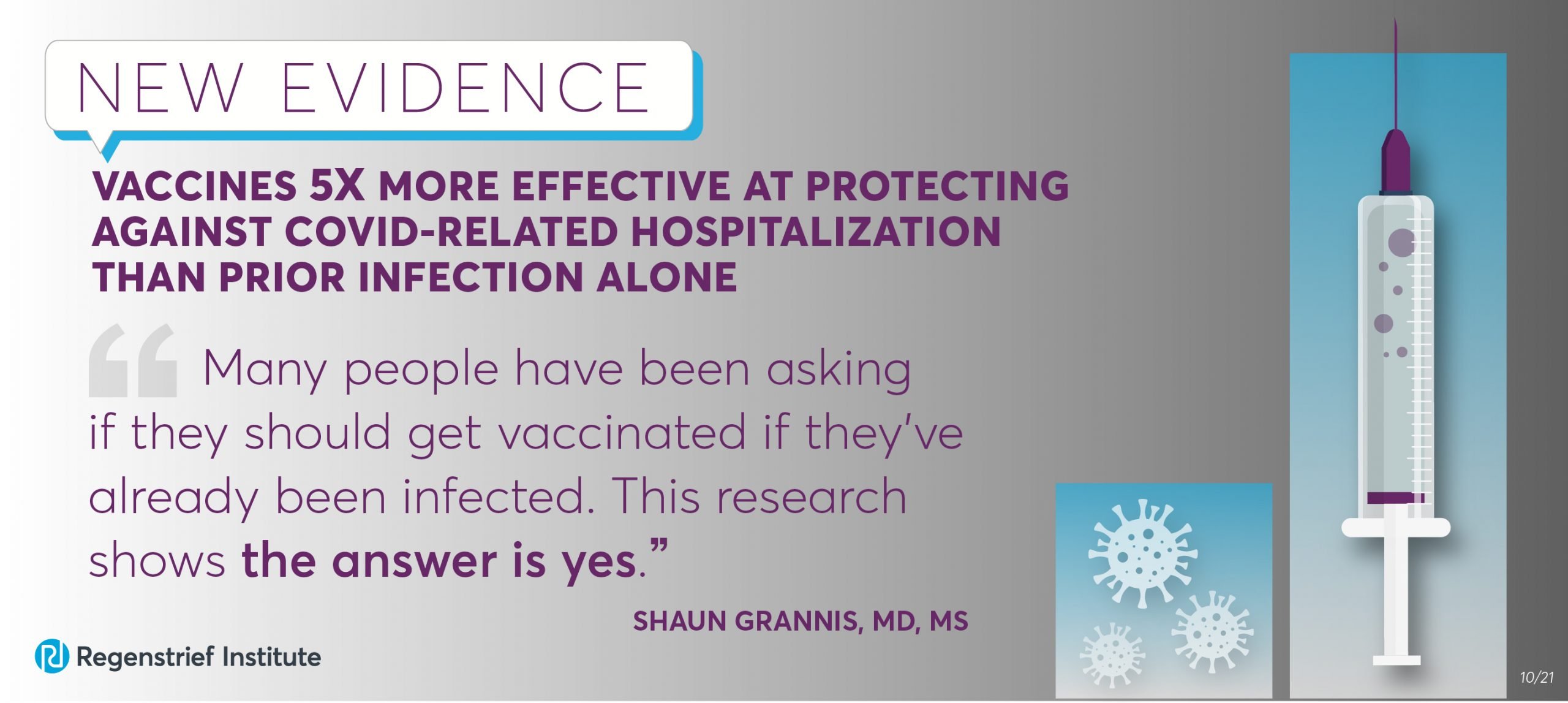Findings suggest people who recovered from the virus should still receive vaccines
A nationwide study from the Centers for Disease Control and Prevention (CDC) shows that mRNA COVID-19 vaccines are associated with significantly more immunity than a prior COVID-19 infection.
Researchers from the CDC’s VISION Network gathered data from more than 201,000 hospitalizations in nine different states. About 7,000 people in that group fit the criteria for this study. The research team analyzed the number of unvaccinated individuals who had a positive COVID-19 test more than three months before being hospitalized for the virus as well as the number of individuals who received the Pfizer or Moderna vaccine and were not diagnosed with COVID prior to being admitted to the hospital. The research team found that overall, unvaccinated adults with a previous COVID-19 infection were about five times more likely to be hospitalized than those who were vaccinated.
“This data provides powerful evidence that vaccinations offer superior protection against COVID-19 than relying on natural immunity alone,” said Shaun Grannis, M.D., M.S., vice president for data and analytics at Regenstrief Institute and professor of family medicine at Indiana University School of Medicine. “Many have been asking if they should get vaccinated if they’ve already been infected – this research shows the answer is yes.” Regenstrief contributes data and expertise to the VISION Network.
The data analysis also found among adults older than 65, overall mRNA vaccines were nearly 20 times more effective at protecting against hospitalizations than prior infection alone.
Authors are from 10 states and 14 institutions, including the public sector, research, clinical and academia. Dr. Grannis was the second author of about 50. Other Regenstrief authors include Brian E. Dixon, PhD, MPA, Regenstrief and IU Richard M. Fairbanks School of Public Health; William F. Fadel, PhD, a Regenstrief fellow; Peter J. Embi, M.D., M.S., Regenstrief and IU School of Medicine; and Nimish Ramesh Valvi, DrPH, MBBS, a Regenstrief fellow.
The study findings are consistent with laboratory evidence that mRNA vaccines create high levels of antibodies, whereas those who recover from COVID-19 have varying levels of antibodies, especially if they experienced mild symptoms or were asymptomatic.
The VISION Network, which conducted the study, includes seven organizations that contribute and analyze data from U.S. healthcare systems to learn more about COVID-19. In addition to Regenstrief Institute, other members are Columbia University Irving Medical Center, HealthPartners, Intermountain Healthcare, Kaiser Permanente Northern California, Kaiser Permanente Northwest and University of Colorado.
The paper “Laboratory-Confirmed COVID-19 Among Adults Hospitalized with COVID-19–Like Illness with Infection-Induced or mRNA Vaccine-Induced SARS-CoV-2 Immunity — Nine States, January–September 2021” is published in the CDC’s Morbidity and Mortality Weekly Report.
Other authors on the paper are Catherine H. Bozio, PhD of the CDC COVID-19 Response Team; Allison L. Naleway, PhD of Kaiser Permanente Northwest; Toan C. Ong, PhD of the University of Colorado; Kristen A. Butterfield, MPH of Westat; Malini B. DeSilva, M.D. of HealthPartners Institute; Karthik Natarajan, PhD of Columbia University and New York Presbyterian Hospital; Duck-Hye Yang, PhD of Westat; Suchitra Rao, M.D. of University of Colorado; Nicola P. Klein, M.D., PhD of Kaiser Permanente Northern California; Stephanie A. Irving, MHS of Kaiser Permanente Northwest; Kristin Dascomb, M.D., PhD of Intermountain Healthcare; I-Chai Liao MPH of Texas A&M University College of Medicine; Sue Reynolds, PhD of the CDC COVID-19 Response Team; Charlene McEvoy, M.D. of HealthPartners Institute; Jungmi Han of Columbia University; Sarah E. Reese, PhD of Westat; Ned Lewis, MPH of Kaiser Permanente Northern California; Nancy Grisel, MPP of Intermountain Healthcare; Kempapura Murthy, MBBS of Texas A&M University College of Medicine; Jill Ferdinands, PhD of the CDC COVID-19 Response Team, Anupam B. Kharbanda, M.D. of Children’s Minnesota; Patrick K. Mitchell, ScD of Westat; Kristin Goddard, MPH of Kaiser Permanente Northern California; Julie Arndorfer, MPH of Intermountain Healthcare; Chandni Raiyani MPH of Texas A&M University College of Medicine; Palak Patel, MBBS of the CDC COVID-19 Response Team; Elizabeth A. Rowley, DrPH of Westat; Bruce Fireman, M.A. of Kaiser Permanente Northern California; Eric P. Griggs, MPH of the CDC COVID-19 Response Team; Matthew E. Levy, PhD of Westat; Ousseny Zerbo, PhD of Kaiser Permanente Northern California; Rachael M. Porter, MPH of the CDC COVID-19 Response Team; Rebecca J. Birch, MPH, of Westat; Lenee Blanton, MPH of the CDC COVID-19 Response Team; Sarah W. Ball, ScD of Westat; Andrea Steffens, MPH, Natalie Olson, MPH, Jeremiah Williams, MPH, Monica Dickerson, MPH, Meredith McMorrow, M.D., Stephanie J. Schrag, DPhil, Jennifer R. Verani, M.D., Alicia M. Fry, M.D, and Eduardo Azziz-Baumgartner, M.D. all of the of the CDC COVID-19 Response Team; Michelle Barron, M.D. of University of Colorado; Manjusha Gaglani, MBBS of Texas A&M University College of Medicine; Mark G. Thompson, PhD of the CDC COVID-19 Response Team; and Edward Stenehjem, M.D. of Intermountain Healthcare.
About Regenstrief Institute
Founded in 1969 in Indianapolis, the Regenstrief Institute is a local, national and global leader dedicated to a world where better information empowers people to end disease and realize true health. A key research partner to Indiana University, Regenstrief and its research scientists are responsible for a growing number of major healthcare innovations and studies. Examples range from the development of global health information technology standards that enable the use and interoperability of electronic health records to improving patient-physician communications, to creating models of care that inform practice and improve the lives of patients around the globe.
Sam Regenstrief, a nationally successful entrepreneur from Connersville, Indiana, founded the institute with the goal of making healthcare more efficient and accessible for everyone. His vision continues to guide the institute’s research mission.
About IU School of Medicine
IU School of Medicine is the largest medical school in the U.S. and is annually ranked among the top medical schools in the nation by U.S. News & World Report. The school offers high-quality medical education, access to leading medical research and rich campus life in nine Indiana cities, including rural and urban locations consistently recognized for livability.
About Shaun Grannis, M.D., M.S.
In addition to his role as the vice president of data and analytics at Regenstrief Institute, Shaun Grannis, M.D., M.S., is the Regenstrief Chair in Medical Informatics and a professor of family medicine at Indiana University School of Medicine.










